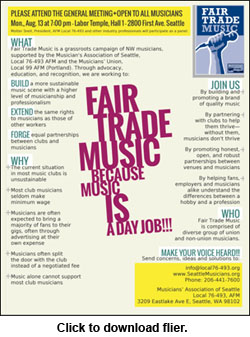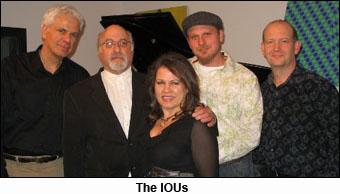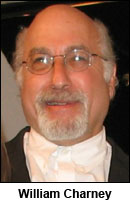LOCAL
Seattle musicians seek sustainable club scene
 How can musicians partner with local clubs to build a more sustainable, professional music scene? That’s what will be discussed at a general meeting of Fair Trade Music, a new grassroots campaign of Northwest union and non-union musicians supported by the Musician’s Association of Seattle, Local 76-493 AFM and the Musicians’ Union, Local 99 AFM (Portland).
How can musicians partner with local clubs to build a more sustainable, professional music scene? That’s what will be discussed at a general meeting of Fair Trade Music, a new grassroots campaign of Northwest union and non-union musicians supported by the Musician’s Association of Seattle, Local 76-493 AFM and the Musicians’ Union, Local 99 AFM (Portland).
The meeting, which is open to ALL musicians, will be Monday, Aug. 13 at 7 p.m. in Hall 1 of the Seattle Labor Temple, 2800 1st Ave.
Why is Fair Trade Music campaign necessary? Read the following column by Seattle-based jazz musician and composer William Charney, the Grammy Award-nominated band leader of the IOUs.
CLUB MUSICIANSHIP IN SEATTLE: THE LONELY LIFE
It’s not easy being a club musician in Seattle, no matter what genre or type of music you play. We are the working-stiff musicians. We are the ones exploited by club owners and promoters who want a great show, but who don’t want to pay the piper.
We routinely play three or four-hour gigs and only get paid what the club makes from the admission of patrons at the door, or even less sometimes. The current way we are paid for our work, makes our lives and our careers unsustainable. Getting receipts from the door brings our pay to about 50 cents an hour — way below the minimum wage. To us, one show means hours of preparation time, rehearsal time, equipment purchase or rental, travel time back and forth from the gig, parking, demo taping and much more. We get exploited for the love of the music. But for us, hope reigns supreme. Maybe one show will bring us a contract, or maybe we will have a good night where pay and atmosphere meld together.
The current situation in most music venues in Seattle is unfair, unsustainable and doesn’t actually support the creation of great music or support a family. But we know local musicians are the life of the city. National groups come and go, are expensive to see and do not represent the inner core of a town. Local musicians are the town’s heartbeat.
But that heartbeat can’t sustain life the way club musicians are paid now. We are expected to bring our own fans to shows by doing the majority of the marketing and advertising, we are expected to perform for almost no wages, provide hours of entertainment, call the club booker 20 or 30 times to get the booking and then be happy with the proceeds we bring in at the door. Sometimes we even have to pay for the doorman out of our percentage of door proceeds, and then we are expected to go home happy… and then try it all again for a re-booking.
 Sometimes it’s worse. My band has been offered only a tape-recording at the end of the gig, no pay at all, not even what the owner took in at the door. Or maybe we will be offered only drinks and a meal.
Sometimes it’s worse. My band has been offered only a tape-recording at the end of the gig, no pay at all, not even what the owner took in at the door. Or maybe we will be offered only drinks and a meal.
Not every club is guilty of these transgressions and we appreciate that. But the majority of the Seattle club scene falls into this category. This inequity forces club musicians into poverty. Many leave the profession before reaching their creative potential. Many work at outside jobs just to pay the rent or put some food on the table. Younger bands are especially vulnerable to exploitation. The craving for exposure and the experience of playing live, to be “heard” is an overwhelming impulse that leads to impulsive acts.
Seattle can do much better. A meeting is being called on Monday, Aug. 13, 2012 at 7 p.m. at the Seattle Labor Temple, 2800 First Ave in Hall 1, to talk to club musicians, to listen to their stories, offer solutions so that we can help each other raise our standard of living. It is being called the Fair Trade Music Meeting and it is sponsored by the Musicians Association of Seattle, Local 76-493 AFM. All genres and types of musicians should attend if you want to help fix the Seattle club scene.
For more information, call Motter Snell, President Local 76-493, AFM (206) 441-7600 or info@local76-493.org.






